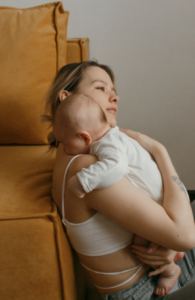Parenting with Intention : Mindful Parenting with Newborns
I always like to joke that the only time I was a perfect parent was when my children were still hypothetical. My hypothetical children were adorable, kind, loving, cooperative beings that absolutely loved every activity I planned for them, adored each other almost as much as they adored me, and always ate all of their vegetables at every meal, begging for seconds of their green ones. In fact, they actually preferred vegetables over other foods because we ate such nutrient dense meals all the time! They never complained or spoke negatively because we enjoyed each other’s company so much, and I lead by example, never losing my temper or raising my voice either.
The Reality of Parenting
The reality of the parent I actually am involves a lot fewer vegetables than I imagined, and quite a few more eye rolls and complaints than I pictured. But that’s okay. Because I’m parenting human beings with a full range of emotions and opinions, and as the saying goes, sometimes perfect is the enemy of good. Striving to be the perfect parent is almost guaranteed to leave me feeling like a failure often, but trying to be a good parent is a much more attainable goal. Today I can say with confidence that I am a good parent, and not only that, but you probably are too.
Being a Good Parent
There are many right ways to be a good parent, and most of them begin with being intentional about the way we interact with our children. Mindful parenting is something that’s frequently talked about referring to older children, and often encompasses discussions on how to be effective with discipline or reduce the stress in your morning or after-school routines, however, being a mindful parent begins from the moment you bring your baby home. Creating an environment for your children to thrive from the very beginning is a wonderful way to help shape who they will become. In doing so, there are a few key components to keep in mind.
What is mindful parenting and why should I do it?
Simply put, mindful parenting is the practice of managing your own emotions and behaviors effectively to help teach your children how to manage theirs. Being a mindful parent involves actively listening to your children, being personally aware of your own thoughts, experiences, and beliefs and how they shape the way you view the world around you, and choosing to interact with, and respond to your children in a way that encourages both them and you in a positive manner.
Mindful parenting has many demonstrated benefits not only to your children, but to you as a parent and person. Practicing mindful parenting helps you connect with your children, understand their behaviors and emotions, and increases your own self-awareness of your emotions, behavior, and individual “hotspots” or triggers. Mindful parenting helps to create a positive and loving parent-child relationship, deepens your bond with your children, models healthy coping mechanisms, and reduces your overall stress and anxiety. Learning to respond calmly to stressful situations and be in control of your own emotions leads to healthy emotional regulation and sense of self, while helping to build those same skills in your child.
Leading by example — Choosing your response
One of the most important ways you can implement mindful parenting, is slowing down and choosing your response, rather than leading with intense emotion or anger. One of the ways I like to remind myself of this is to remember “what I *DO* speaks so loudly that my children cannot hear what I say.” Leading by example is powerful for children, they already look to us so much in their efforts to understand the world around them. So if I tell my children repeatedly “No yelling!” but I yell at them readily throughout the day when they make small mistakes, my words are meaningless because my actions are more memorable. When we lead with stressful, angry responses to the world around us, our children get the message that it’s also how they are supposed to respond. When we pause, reflect, and then respond to the world around us in a gentler manner, our children also get the message that they too should respond in this way.
Does that mean we cannot ever get upset? Of course not! We are whole human beings too and it’s okay for our children to see us experience a full range of emotions. Children will more often than not match our energy. So if we want them to react explosively frequently, then yelling and reacting intensely to them repeatedly will yield that result. If we want them to choose their reactions with more discernment, then leading with that example will demonstrate the importance of being mindful. We can’t get it right every time though, and sometimes we all make mistakes. Don’t ever underestimate the power of an apology. Apologizing to children when you raise your voice, or react with negative emotions instead of slowing down with an intentional response, is another powerful way to lead by example and model a healthy and positive emotional response to making a mistake.
Put your own oxygen mask on first.
I can not stress the importance of this next one enough – taking care of yourself IS taking care of your children. We cannot expect to be in parenting mode all of the time and not become burnt out, stressed out, and unhappy. One way I try to think about this is to remind myself “I cannot handle a full plate with an empty cup.” Doing things that bring me joy, and replenish my emotional and physical reserves, make me a better mother. Yes, I did just say that spending more time away from my children makes me a better parent. This is a hill I will die on. Setting aside time for yourself to do things that make you feel like the best version of you is critical to your happiness as a human being, and to your success as a parent. Bonus, it’s also setting a wonderful example for your children to learn to spend time on themselves too, and to view their parents as human beings with their own needs.
Research has shown again and again the catastrophic impact that too much stress has on individuals and families. Reducing your overall stress is critical to being an effective parent. Learning to say no to things you want to say no to, especially things that do not add value to your life, and yes to things that fill you with joy and nourish your emotional well-being, is a critical life skill. Practice this like your life depends on it. Your children are watching, and they need to learn how to do this too!
How can I practice mindful parenting with an infant?
Infancy can be a very overwhelming stage in your child’s life. The demands of caregiving are intense and frequent, and there is little to no return on your investment at first, as your child has not yet formed a deep connection to you or even learned to smile when you feed them and clean their messes and soothe their cries. It’s very easy to become overwhelmed rapidly by the demands of this reality. Remember to pause and consider what your baby is telling you. Are they hungry? Has their diaper been changed recently? Is it time for the baby to rest? If all of their basic needs are met, but the baby is still upset, it’s possible they are overstimulated. Remembering to stay calm and reduce the stress of an environment can go a long way when caring for your infant. This may mean moving to a dimly lit environment or turning some of the lights off, reducing the noise level by turning off electronics and leaving noisy environments, and holding your baby close to your body while reducing visual stimulus.
Remember that stress is contagious, so the more in control of your emotions and feelings you are, the more secure your infant will feel in your care. One of the ways I maintain my composure when caring for an infant with escalated cries, is to quietly explain each thing I am doing for them. This method helps to remind myself that I’m actively doing something to alleviate the baby’s cries while communicating the same to the baby. Rather than responding to the baby’s cries by simply trying to shush or stop the crying, I’m acknowledging their emotional state and responding to the baby in an effort to truly alleviate the cause of their cries. This might look like me laying the baby down on the changing table if it’s not time for feeding or sleeping, and simply stating in a calm, quiet, even tone, “I’m just going to check your diaper and see if you might be wet or uncomfortable.” If that wasn’t the issue, I might massage their belly and say “I think you might have some gas in your belly. I’m trying to help it out.” If the baby continues to cry, I might pick them back up and let them know “I hear you, I can see that you’re upset, we’ll try another position now,” as I move them to a room with less stimuli. At each juncture, I’m explaining to the baby what I’m doing for them, I’m maintaining a calm, quiet tone to demonstrate to the baby that I am not upset, and inviting them to join my calm at any time. When the baby successfully begins to calm down, I will acknowledge their calmer state, I might say “you seem to be feeling much better; it seems that you like facing outwards.” Narrating my behavior is doing multiple things simultaneously. My calm demeanor and tone is communicating to the baby that there is no need to be stressed, and by talking about what’s happening I am both building the baby’s receptive language skills and committing to my own memory as well what works when the baby is upset. All of these things will improve my skills as a mindful parent, and improve my relationship with my baby.
Practicing your skills of mindful parenting
You won’t become a mindful parent overnight, and it might even feel outright awkward or uncomfortable at first in practice. But keep doing these things each day, and the more you practice, I promise, they will become second nature before long.
Parenting with Intention with the Help of a Postpartum Doula
Still not sure where to begin your journey to parenting with intention? Hire a postpartum doula to help you! Children aren’t the only ones that learn by example. Watching someone else care for your baby in the way you desire to care for them will give you something to emulate. Our doulas are experienced in many different parenting styles and are equipped to demonstrate compassionate, intentional newborn care.

